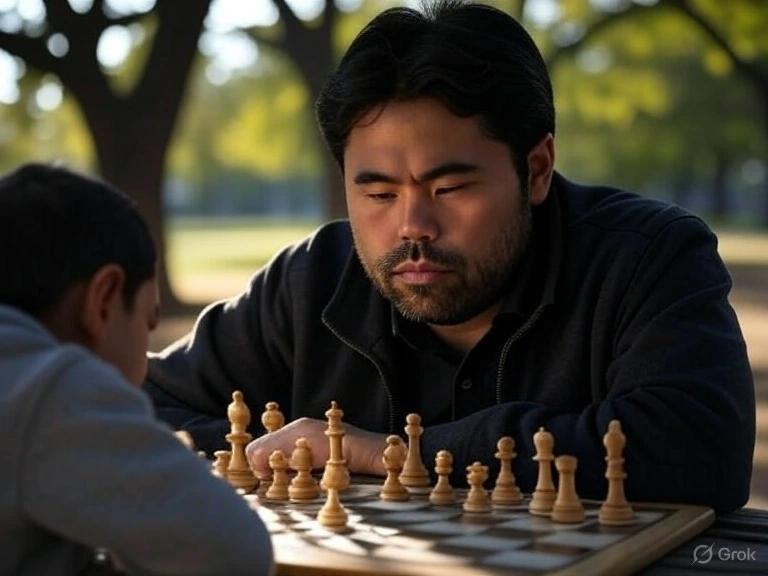The Labor Day weekend tournament in New Orleans was supposed to be a quiet, regional affair. Ninety players, most rated between 1500 and 2200, gathered inside Loyola University’s Danna Center for the 2025 Louisiana State Championship. Prize funds were modest: $800 for first place, $3,000 overall. It’s the kind of grassroots event that defines American weekend chess.
Then Hikaru Nakamura showed up.
The world number three, rated 2807 FIDE, registered the night before the first round. He strolled into the hall, sat across from a 1563-rated local named Harry James, and opened with 1.b4, the Orangutan. Suddenly, the Louisiana State Championship wasn’t just a state tournament. It was the latest flashpoint in the ongoing drama of how the Candidates Tournament is decided.
The Candidates Puzzle
At the center of this story is one of the most controversial qualification paths for the Candidates: the rating spot. Alongside more traditional paths like finishing top in the World Cup or Grand Swiss, one place in the Candidates goes to the player with the highest six-month average rating, provided they’ve played at least 40 classical games.
Nakamura is currently the highest-rated eligible player. Technically, Magnus Carlsen holds the higher rating, but since he has declined to participate in the Candidates cycle, the door is open. There’s just one problem: Hikaru has only played 18 rated classical games this year. To meet the 40-game requirement, he needs to find 22 more.
His solution? Entering local tournaments across the U.S., starting with Louisiana.
“Thus far in this calendar year, I’ve played 18 games of classical chess,” Hikaru explained in his recap video. “But in order to be eligible, I need to play 40. So, I’ve been looking at various tournaments throughout the United States, also a little bit in Europe, and maybe Canada to boot. Ultimately, I settled on trying to compete in this Louisiana State Championship.”
Levy Rozman: “Chess Drama Is Back on the Menu”
The move didn’t go unnoticed. GothamChess, better known as International Master Levy Rozman, dropped everything to record a 30-minute breakdown for his 4.5 million YouTube subscribers.
“Ladies and gentlemen,” Rozman opened, “this video is being recorded on September 1st, 2025, which means we are kicking off the final third of the year. And quite fittingly, chess drama is back on the menu.”
Rozman explained the mechanics of the situation: for every win against a player rated 400 points lower, Hikaru gains 0.8 rating points. Under old FIDE rules, that “bonus” only applied once per tournament. But in 2024, FIDE quietly changed the regulation. Now Hikaru can theoretically farm dozens of these small gains, all while simply meeting the 40-game threshold.
“It’s not about the rating,” Rozman clarified. “What he’s trying to do is qualify by playing the amount of games. This has been done before. Firouzja did it, Ding Liren did it. The issue isn’t Hikaru. The issue is the system.”
Still, the optics are striking. Watching a 2800-rated superstar face off against 1800-rated club players looks like Lionel Messi showing up to a Sunday league game. Rozman didn’t miss the irony: “Fun fact, Hikaru could become the number one rated player in the world if he just farms enough of these events. He’s only 29 points behind Magnus. Do you understand that?”
Hikaru’s Defense
For his part, Nakamura isn’t pretending the situation is normal. In fact, he’s been blunt. He has called these tournaments “Mickey Mouse events”, not to insult organizers, but to highlight the absurdity of the rating-spot rule.
“Obviously this is not ideal to start the tournament,” he said after his first game, “but nonetheless I am providing a very special and unique experience for this player who otherwise will never have the opportunity to compete against top-level competition.”
Indeed, for players in New Orleans, the chance to play Hikaru was a once-in-a-lifetime opportunity. One club player compared it to Messi showing up for a pickup match. Nakamura even shared a heartwarming story of a foreign player visiting Louisiana who unexpectedly found himself paired with the American superstar.
That duality – farce for the system, magic for the locals – is what makes the Louisiana State Championship so fascinating.
Mixed Reactions
Not everyone is thrilled. Grandmaster Ian Nepomniachtchi, never one to shy away from commentary, has repeatedly criticized the rating-spot pathway. “Year after year FIDE literally doesn’t care about the rating spot,” he said recently. Danish trainer Jacob Aagaard wondered aloud whether FIDE might eventually “disallow legal events from being rated” to stop these scenarios.
Yet most of the criticism is aimed at the system, not Nakamura. After all, he’s just playing by the rules that exist. If Ding Liren and Alireza Firouzja had to scramble for games in past cycles, why shouldn’t Hikaru?
Rozman captured the contradiction perfectly: “Good for Hikaru. Bad for chess.”
What Comes Next
The Louisiana State Championship is only the beginning. Hikaru needs more than 20 games before January 1st, and Louisiana provides just six rated ones. Expect to see him pop up in other weekend tournaments across the U.S., perhaps even in small Canadian or European events.
If he keeps winning, two outcomes are possible. One, he qualifies comfortably for the Candidates as the rating-spot representative. Two, in the process of farming games, he creeps past Magnus and becomes world number one, by beating players hundreds of points below him.
That, more than anything, exposes the tension at the heart of chess’s qualification system. Should the world’s most prestigious challenger tournament hinge on a metric that encourages elite players to enter state championships and club events?
For now, the answer seems to be yes.
A Special Weekend in New Orleans
As flawed as the system may be, for Louisiana players the weekend was unforgettable. Ninety locals got to share the hall with one of the most famous grandmasters alive, shake his hand, maybe even take a game score home as a souvenir.
The Candidates debate will rage on for months. Hikaru himself admits the process is “ridiculous.” But for Harry James, the 1563-rated amateur who got to face the Orangutan Opening from Nakamura in round one, none of that matters. He’ll always have the story of the day he sat across from a legend.
And maybe that’s the paradox: what feels like farce on the world stage is magic on the local board.
Watch the tournament here

I’m a passionate board game enthusiast and a skilled player in chess, xiangqi and Go. Words for Attacking Chess since 2023. Ping me at Lichess for a game or chat.

